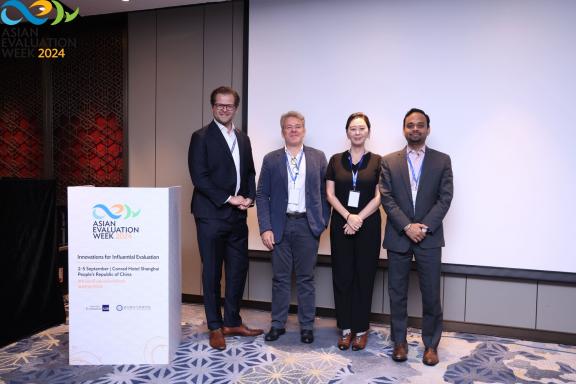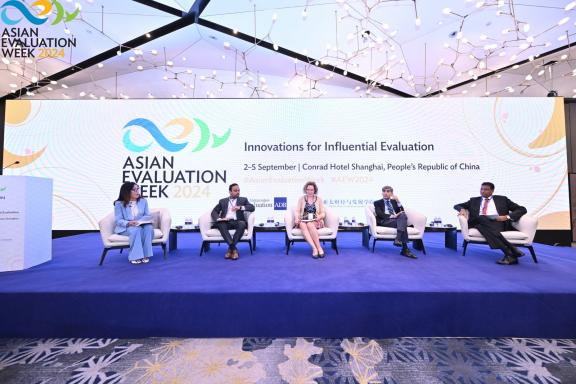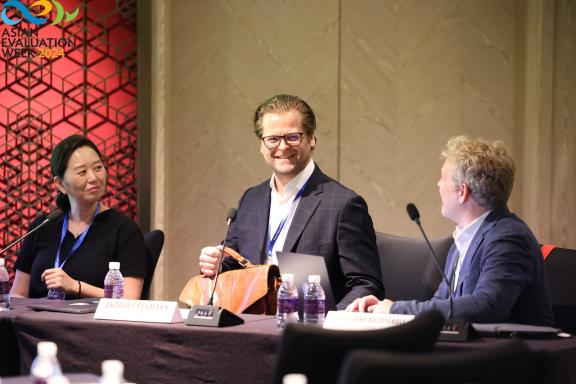The IEU Showcases GCF's Climate Impact Evidence at Asian Evaluation Week 2024
The Independent Evaluation Unit (IEU) of the Green Climate Fund (GCF) made significant contributions, presenting in three sessions at the recently concluded Asian Evaluation Week, 2024. Asian Evaluation Week 2024 took place in Shanghai, China, from 2-5 September, gathering experts from around the world, representing development organizations, governments, and the private sector to discuss key development and evaluation strategies under this year’s main theme, Innovations for Influential Evaluation. The event is jointly organized by the Ministry of Finance, PRC, through the Asia-Pacific Finance and Development Institute (AFDI), and Asian Development Bank’s Independent Evaluation Department (IED).
On 3 September, Prashanth Kotturi, Principal Evaluation Officer at the IEU, participated in Plenary 3, titled Engaging for Impact: Enhancing Country Partnerships. The session highlighted how multilateral development banks use tailored partnership strategies to address risk assessments, private sector goals, and global public goods. During the discussion, Kotturi emphasized the importance of long-term engagement in climate finance, stressing that country ownership and strong donor partnerships are critical for sustaining public goods. He noted that, according to the IEU/GCF's synthesis on Direct Access, country partners often demonstrate more resilience during crises than international actors.
The IEU also hosted Parallel Session 18, Water, Climate, and Communities: Generating Impact Evidence for Climate Solutions in Vulnerable Contexts. Presenters included Andreas Reumann, Head of the IEU; Jeehyun Yoon, Evaluation Specialist at the IEU; and Cristiano Rossignoli, MEL and Impact Assessment Research Leader at WorldFish, moderated by Prashanth Kotturi. This session, the only one focused on climate change, drew significant interest from participants eager to learn about measuring the impact of climate interventions to improve programming. Presenters discussed the importance of building robust evidence for climate adaptation efforts, especially in vulnerable regions like Bangladesh and the Cook Islands. They highlighted how evidence can drive effective and sustainable climate interventions, drawing on the GCF’s evidence gap intervention in climate change adaptation in low- and middle-income countries, along with the IEU’s impact evaluation of livelihood support on vulnerable groups, particularly women in Bangladesh and WorldFish’s case studies on small-scale aquaculture, with emphasis on understanding local contexts and behavior changes.
The audience asked panelists how to measure empowerment dimensions in an impact evaluation, and panelists responded with insights on conducting evaluations alongside local institutions to ground program theories in local contexts.
In the plenary session Evaluation Headlines Live: Evolving Role of Evaluation in Preparing for an Uncertain Future, Andreas Reumann discussed how organizations and evaluators are adapting to address uncertainties in development, particularly those posed by climate change and digital transformation. The session emphasized the importance of considering climate co-benefits and improving the density of evidence related to climate impacts, such as water, land use, and energy efficiency. It also highlighted the critical role of evaluation in navigating the uncertainties caused by climate change and technological innovation, while addressing gaps in evidence and skills necessary for successful transitions.
For the past eight years, Asian Evaluation Week has been a key platform for building the global evaluation community. It continues to foster insightful discussions focused on enhancing sustainability and driving innovations in evaluation practices.


